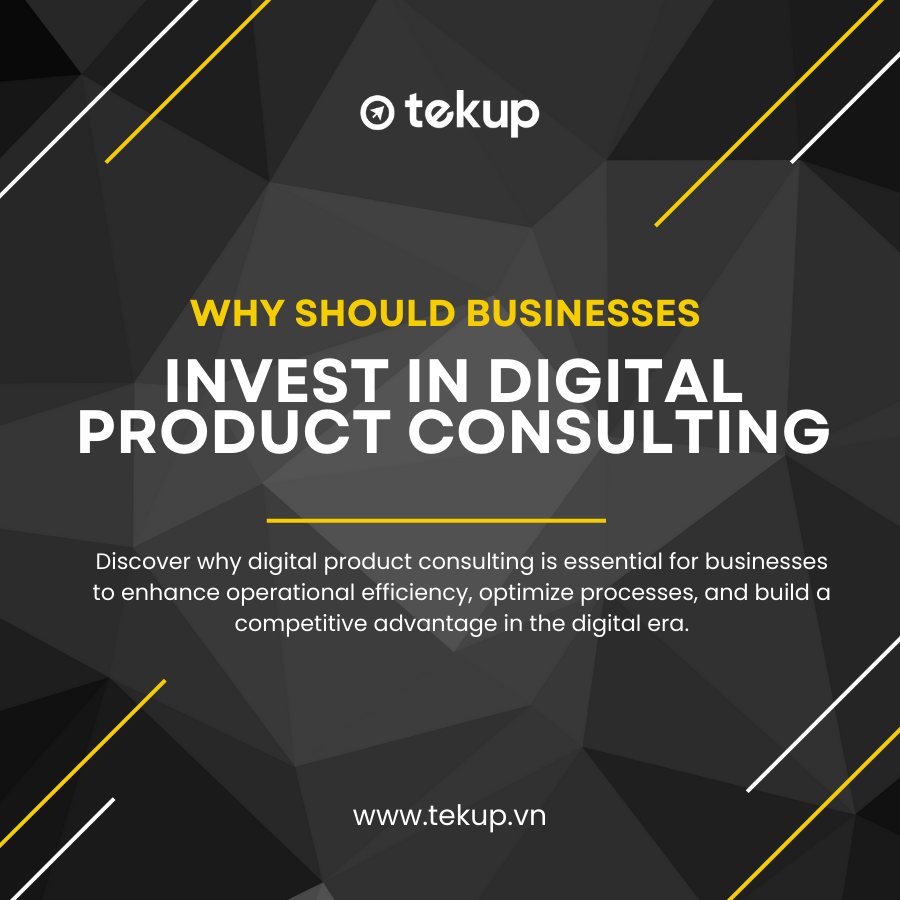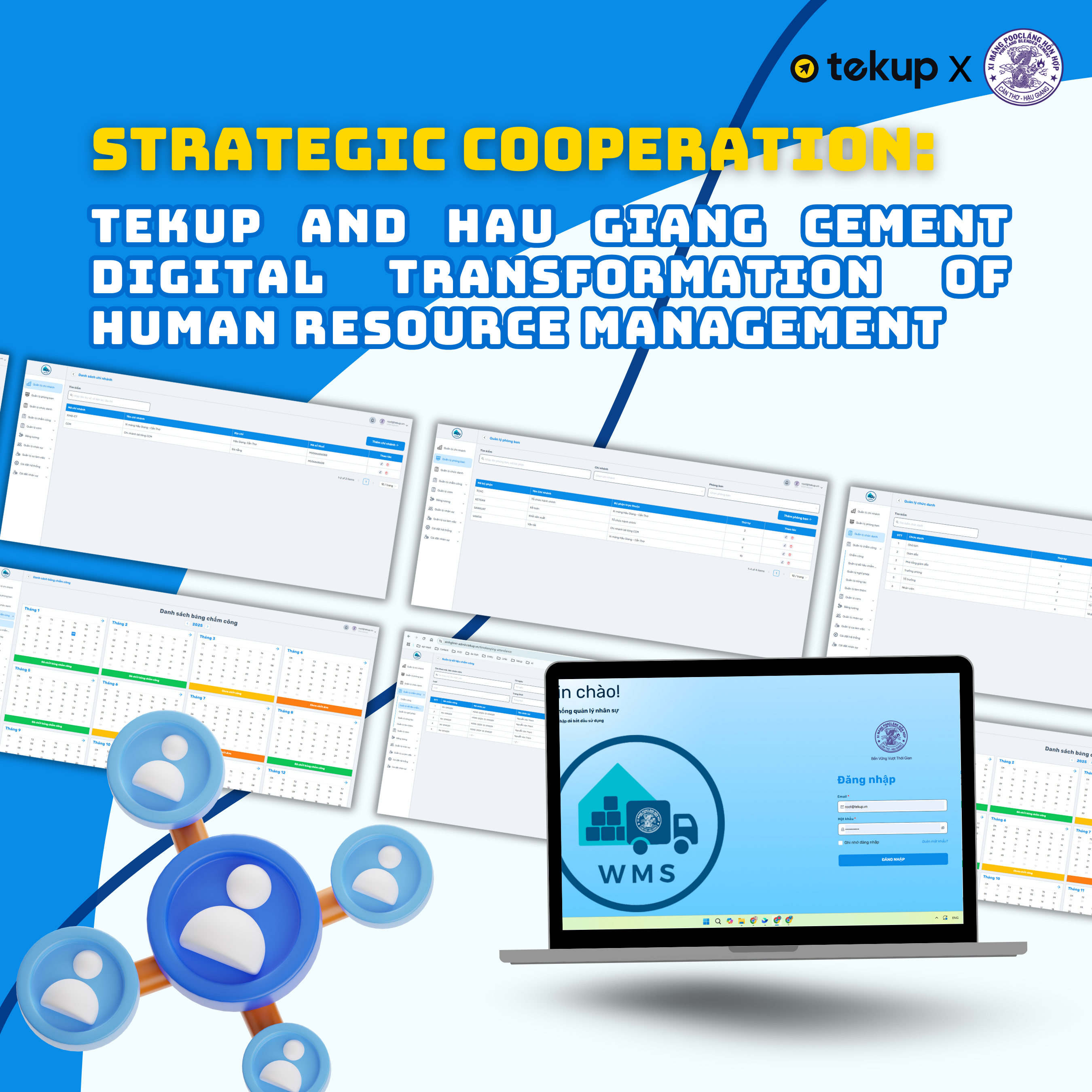Every industry is experiencing a significant transformation driven by technology, and digital products are becoming a core factor in helping businesses maintain their competitive edge. However, not every company fully understands how to leverage technology to optimize their products. This is precisely why investing in digital product consulting is crucial. Receiving guidance and specific strategies from experts helps businesses shape a clear development roadmap, thereby improving operational efficiency and establishing a strong market position.
What Are Digital Products, and Why Is Digital Product Consulting Necessary?
Digital products are solutions, services, or applications created and operated on digital platforms to meet user needs in an online environment. From mobile apps and websites to management software, digital products can support various fields like e-commerce, healthcare, education, and many others. With their flexibility and broad accessibility, digital products not only facilitate user connections and transactions but also provide convenient and personalized interactive experiences.

In the context of rapid technological advancement, developing a digital product requires more than just building an app or website. Digital product consulting provides businesses with a clear roadmap, from market analysis and identifying customer needs to crafting suitable development strategies. By collaborating with consulting experts, companies can optimize their development processes, minimize risks, and ensure their products meet market expectations effectively, gaining a sustainable competitive advantage in the process.
What issues do businesses need digital product consulting to address?
Understanding customer needs and preferences: A digital product can only be truly successful when it meets customer demands. However, understanding consumer preferences is not always easy. Digital product consulting helps businesses analyze the market and gain deep insights into user behavior, allowing them to design features and experiences that best match those needs.
Shaping a product development strategy: Developing a digital product involves more than just building and launching; it requires a clear strategy from concept to long-term growth. Digital product consulting assists businesses in creating a development roadmap, identifying critical stages, necessary budgets, and resources, and making sound decisions to achieve business objectives.
Optimizing user experience (UX): A smooth and user-friendly experience increases satisfaction and enhances customer retention. Digital product consulting helps businesses design effective interfaces and interactions, ensuring the product delivers both aesthetically and functionally, maximizing conversion rates.
Enhancing competitiveness: In a highly competitive market, digital products need to stand out. Consultants provide insights into technology trends, new standards, and factors that drive competitive advantage. This enables businesses to introduce unique features or improve user experiences to attract and retain customers.
Risk management and security assurance: Developing digital products involves tackling risks related to security and product stability. Digital product consulting helps businesses establish secure systems, mitigate threats, and protect user data while minimizing risks throughout the development and operational phases.
Optimizing development and operational costs: Digital product consulting not only saves time but also helps businesses optimize expenses. From selecting the right technology and establishing efficient processes to controlling operational costs, experts guide businesses in maximizing budget efficiency and ensuring smart investment in their digital products.

Thanks to comprehensive consulting solutions, businesses not only optimize their digital products but also build a solid foundation for future growth and expansion.
Benefits of Digital Product Consulting for Businesses
Digital product consulting brings practical benefits to businesses, especially in the context of increasing digitalization and competition. Here are the main benefits of digital product consulting:
Time and Cost Savings in Development: Digital product consulting helps businesses clearly define the development roadmap, thereby avoiding wasting time and resources on unnecessary features. Experts will recommend solutions that fit the budget, optimizing costs from the ideation phase to deployment and maintenance.
Accurate and Effective Product Strategy Formation: With digital product consulting, businesses gain an overview of the market, analyze strengths and weaknesses, and build an effective product development strategy. This not only helps businesses focus on core features but also enhances competitiveness and the likelihood of product success.

Improving User Experience (UX): Digital product consulting plays a key role in optimizing user interface and experience. A product that is user-friendly and easy to navigate will increase customer satisfaction, boost conversion rates, and enhance user retention.
Enhancing Security and Risk Management: Experts in digital product consulting help businesses identify and mitigate security risks, ensuring that digital products are well-protected against external threats. This helps safeguard customer data and maintain the business’s reputation.
Increasing Flexibility and Adaptability to Change: With expert guidance, businesses can easily keep up with and adapt to new technological trends. Digital product consulting enables companies to develop products that are scalable, upgradable, and capable of integrating with future technologies.
Boosting Operational Efficiency and Process Optimization: Digital product consulting goes beyond the product itself, helping businesses improve their operational processes. By applying automation technologies and optimizing workflows, companies can enhance efficiency, reduce errors, and increase productivity.
Supporting Strategic Decision-Making: Digital product consulting provides businesses with data and detailed analysis, assisting leadership in making informed strategic decisions based on real-time insights. This ensures that products meet business goals and address market demands effectively.
Through digital product consulting, businesses can not only develop sustainable products but also lay the foundation for long-term growth in a competitive digital landscape.
Factors to Consider When Searching for Product Consulting
When searching for digital product consulting services, businesses need to consider several important factors to ensure they select the right partner who can effectively meet their needs and deliver results. Here are the key factors to note:
Experience and Expertise of the Consulting Team: The consulting team should have extensive experience and in-depth knowledge in digital product development, particularly in the industry in which the business operates. This ensures they understand the specific challenges and needs of the market, enabling them to provide appropriate and effective solutions.
Understanding of Technology and Latest Trends: The rapid advancement of technology requires the consulting team to stay up-to-date with new trends such as Artificial Intelligence (AI), Machine Learning, Blockchain, and the Internet of Things (IoT). This helps businesses choose and apply the most optimal technology for their products.
Strategic Thinking Ability: Digital product consulting involves more than technical support; it requires shaping a comprehensive product strategy. The consulting team must have the ability to analyze the market, identify target audiences, and plan product development from concept to implementation.
Feedback from Previous Clients: Reviews from past projects and clients are a valuable source of information to understand the consulting partner’s capabilities. Positive feedback, client testimonials, and successful projects in the past are good indicators of reliability and the ability to deliver high-impact results.
Communication and Teamwork Skills: During product development, collaboration and clear communication between the business and the consulting partner are crucial. The consulting team should be able to convey ideas, report progress, and discuss changes transparently to ensure consistency throughout the process.
Post-Launch Support Services: Once the product is launched, the business may need ongoing support and maintenance to meet user needs and address any arising issues. The consulting team should offer post-launch support services, including updates, bug fixes, and product optimization.
Pricing and Service Flexibility: While cost is an important factor, businesses should also consider the flexibility of the service. Can the consulting team adjust to the specific needs and budget of the business? Cooperation terms should be clear and transparent to avoid unexpected costs.

By choosing the right digital product consulting partner, businesses not only receive professional support but also ensure their product meets market needs and achieves sustainable growth.
Digital Product Consulting Process for Businesses
The digital product consulting process for businesses typically includes the following key steps, ensuring that the product is developed to align with market needs and the company’s business strategy:
A. Needs Analysis and Goal Setting
Requirement Identification: The consulting team holds meetings with the business to understand its needs, business objectives, and current challenges.
User Identification: They research the target audience, customer needs, and the value the product should deliver.
Goal Setting: They establish the main goals the business aims to achieve through the digital product, such as increasing revenue, improving user experience, or optimizing internal processes.
B. Market Research and Competitive Analysis
Competitor Analysis: The consulting team conducts an analysis of competitors’ digital products, assessing their strengths, weaknesses, and potential opportunities for competitive advantage.
Identifying Technology Trends: Researching new technology trends in the industry to propose optimal solutions that provide a competitive edge for the product.
Defining Product Features: Listing the key features necessary to meet user needs and align with the company’s goals.
Creating Prototypes: The design team can develop prototypes or visual interfaces to give the business a clear vision of the final product.
Development Planning: Outlining the product development roadmap, from the construction phase to testing and deployment.
C. Planning Product Deployment and Development
Dividing Development Phases: Projects are often divided into phases such as developing the MVP (Minimum Viable Product) and adding additional features.
Resources and Technology: The consulting team assists the business in selecting suitable tools, platforms, and programming languages to optimize the development process.
Building the Product: The technical team develops the product according to the established standards and goals.
Continuous Testing: The product is tested at each stage to identify and resolve issues, ensuring stable performance.
Gathering User Feedback: Conduct user surveys or beta testing to collect feedback and make necessary product adjustments.

Investing in digital product consulting is not just a choice but a smart strategy to ensure sustainable growth in an ever-evolving technological landscape. With support from experts, businesses can fully harness the potential of their digital products, enhance their competitiveness, and be well-prepared for future challenges. In summary, digital product consulting is the key to not only keeping up but also leading in the digital era.



